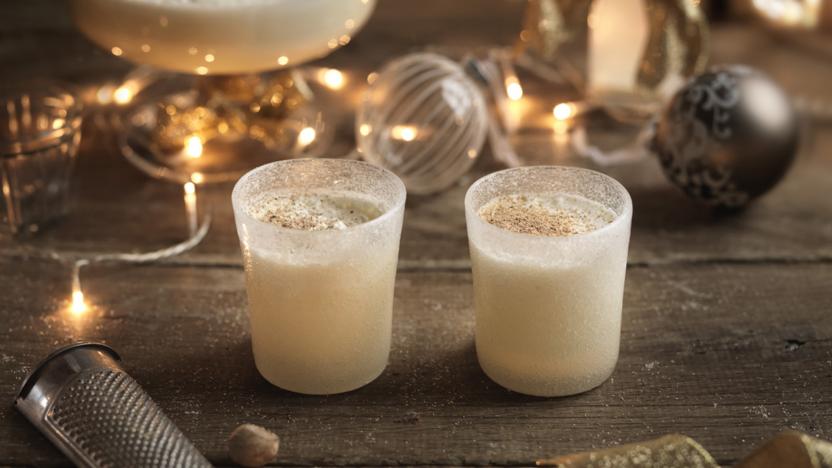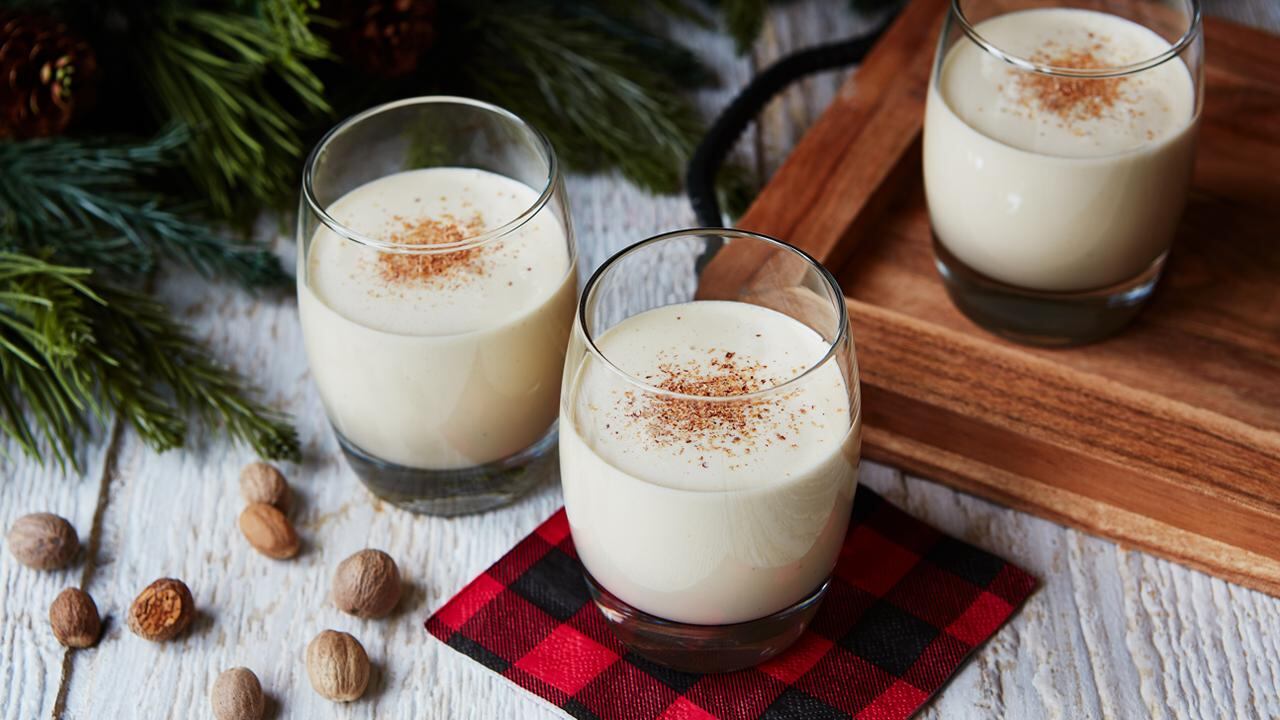Eggnog traces back centuries as a drink people either savor or find too heavy to indulge in with its combination of dairy, spices, and raw eggs. But lest we forget the alcohol.
While there are non-alcoholic versions available or you can make, the traditional and standard forms of the drink contain varying sorts of spirits, from rum and whiskey to wine, beer, and on.
The history of eggnog is a little hazy. Still, historians concur that the drink originated as a medieval “posset,” a combination of “hot curdled milk with either ale or wine” and spices and sweeteners to taste, usually in the form of cinnamon and nutmeg. Separating the curds was common for eating alongside the beverage.”
The ingredients of fresh eggs and milk, spices, and spirits were seen as a luxury as time passed, with the wealthy indulging on special occasions and holidays.
Ultimately, the drink made its way to the states where George Washington, in the late 1700s, infamously was noted to have created a recipe with heavy doses of liquor, including brandy, rum, sherry, and rye, instructing his staff to “taste frequently.”
Eventually, as the drink’s popularity grew and with the abundance of farms making the ingredients readily available in America, the beverage became accessible to everyone.
Rum became the preferred spirit, with the potency of the liquor boasting the capacity to preserve the egg and dairy before refrigeration. Let’s look at some interesting facts associated with eggnog that many might not be aware of.
Table of Contents
ToggleFun Facts Many Might Not Know About Traditional Alcoholic Eggnog

Eggnog is traditionally an alcoholic drink from centuries ago to the present day. It is possible to purchase or make non-alcoholic variations, but when considering the beverage for a holiday occasion, most would think of it as containing a spirit, usually rum.
The beverage is established on its own day, with December 24 being “National Eggnog Day” and the month of December is “National Eggnog Month,” showing the popularity it has developed. With that comes a natural curiosity about facts about the beverage. Let’s look at the history of eggnog to see what led to its current status.
The origins were traced to medieval times
Many historians believe eggnog began as “posset,” a popular 14th-century milk-based drink consisting of wine and spices. The hot drink was widely favored as a cocktail but was also considered a comforting remedy when suffering from the flu or cold.
The drink was a mainstay in the era throughout the Shakespearean period, although in “Macbeth,” it was made famous for its nefarious use.
George Washington may or may not have created a famously liquor-filled recipe
The first US president enjoyed Christmas with eggnog that he created with a recipe that still famously circulates today, although he didn’t mention how many eggs you would need.
He did, however, advise to include roughly “one pint of brandy, 1⁄2 pint rye whiskey, 1/2 pint Jamaica run, 1⁄2 pint of sherry to be mixed together.” While the drink was being made, the president instructed that staff “taste the beverage frequently.”
Dwight D. Eisenhower also preferred his eggnog with a “boozy edge.”
The 34th president found cooking a preferred method for relieving stress with a myriad of recipes, including one for eggnog that could render a person drunk quickly with a “quart of bourbon added to a dozen eggs, one quart of half/half, and a quart of whipping cream.”
While the drink was exceptionally potent with its alcoholic content, it was also considered “creamy and light.”
An intensely spiked eggnog batch created an infamous riot at West Point
Referenced as “The Grog Mutiny,” the eggnog riot was a holiday soiree at West Point Military Academy that went off track in the year 1826. Colonel Sylvanus, the school’s superintendent, had prohibited alcohol from being on campus earlier in the semester.
The respected superintendent was deemed the “Father of West Point” as he had transpired what was a derelict student body into the disciplined campus people know it to be today.
Eggnog was a part of the holiday tradition each year at the school; however, with the alcohol moratorium, the festivities were looking bleak. Some cadets decided to smuggle the beverage into the campus for the party from local taverns, with many ending up “rip-roaring drunk.”
The results were a shaker with the destruction of property, gunshots, swords drawn (no physical harm), and “19 cadets expelled.
The US Army retells the riot story on the official homepage warning the cadets to “not let one night of raucous alter their future in the same way 19 cadets had.”
People complained when Starbucks removed the “Eggnog latte” from the holiday offerings
Customer backlash was swift in 2014 when Starbucks decided to take the “Eggnog Latte” from the offerings on its menu. People began by spreading letters of complaint, followed by phone calls, and then headed to their social networks.
The drink had been part of the menu since the late 1980s but was being dropped to make what was becoming an expansive menu more simplified.
The company was forced to issue a message of apology to its loyal customers indicating their mistake and added the eggnog-flavored drinks back on, with these continuing to be associated with every holiday menu.
Conclusion
Whether you try George Washington or Dwight D. Eisenhower’s recipe, buy a brand already made at the supermarket, or come up with your own concoction, you can either include alcohol or you don’t need to. It’s entirely your call. Traditionally, tracing back through history, it is an alcoholic drink that has always included either spirits, wine, or alcohol.
A most common choice is rum, but you can make it however you prefer. As George Washington said, you should “taste frequently” while creating the drink to see if you’re on the right track.
While December is set aside for the beverage, that doesn’t mean you can’t whip up a batch whenever you get a craving. You can enjoy eggnog year-round if you have the desire. Drink it slowly, savor the flavor, and contain your alcoholic pleasure.

I am a passionate beer connoisseur with a deep appreciation for the art and science of brewing. With years of experience tasting and evaluating various beers, I love to share my opinions and insights with others and I am always eager to engage in lively discussions about my favorite beverage.
















